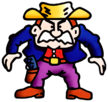List of spirits (Duck Hunt series)
From SmashWiki, the Super Smash Bros. wiki
Jump to navigationJump to search
The following is the list of the spirits from the Duck Hunt series in Super Smash Bros. Ultimate.
Primary Spirit
| No. | Image | Name | Type | Class | Slot | Base |
Max |
Base |
Max |
Base |
Max |
Ability | Origin Game | Acquisition |
|---|---|---|---|---|---|---|---|---|---|---|---|---|---|---|
| 975 | Wild Gunman | ★★ | ⬡⬡⬡ | 1,424 | 5,699 | 1,033 | 4,132 | 391 | 1,567 | No Effect | Wild Gunman | •Battle via World of Light (The Dark Realm) •Battle via Spirit Board •Purchase from the Vault Shop for 1000G |
Support Spirit
| No. | Image | Name | Class | Cost | Ability | Origin Game | Acquisition |
|---|---|---|---|---|---|---|---|
| 976 | Gangster, Lady, & Policeman | ★ | ⬢ | Rage Blaster Equipped | Hogan's Alley | •Battle via World of Light (Mysterious Dimension) •Battle via Spirit Board •Purchase from the Vault Shop for 500G |
Fighter Spirit
| No. | Image | Alternate Artwork | Name | Origin Game | Acquisition |
|---|---|---|---|---|---|
| 974 | Duck Hunt Duck Hunt Duo |
Duck Hunt | •Clear Classic Mode as Duck Hunt •Purchase from the Vault Shop for 300G (after unlocking Duck Hunt) |
Spirit Battles
| Spirit | Battle parameters | Inspiration | ||||||||
|---|---|---|---|---|---|---|---|---|---|---|
| No. | Image | Name | Enemy Fighter(s) | Type | Power | Stage | Rules | Conditions | Music | |
| 975 | Wild Gunman | •Duck Hunt Team |
3,400 | Gerudo Valley (Ω form) | •Temporary Invincibility •Item: Shooting Types |
•Start with 300% damage •All fighters will occasionally be invincible •Reinforcements will appear after an enemy is KO'd |
Dillon's Rolling Western: The Last Ranger |
| ||
| 976 | Gangster, Lady, & Policeman | •Wolf •Peach •Ike |
1,700 | Tomodachi Life (Battlefield form) | N/A | •Defeat the main fighter to win | Duck Hunt Medley | Spirit Battle inspiration:
Other trivia:
| ||
Series Order
| Number | Name | Series |
|---|---|---|
| 974 | Duck Hunt Duck Hunt Duo |
Duck Hunt Series |
| 975 | Wild Gunman | Wild Gunman |
| 976 | Gangster, Lady, & Policeman | Hogan's Alley |
Trivia
- The Duck Hunt series and R.O.B. series have the fewest Spirits of any first-party series, each with a total of 3.
- None of the Duck Hunt universe Spirits are fought on the Duck Hunt stage. This is likely due to the fact that these Spirits originate from games unrelated to Duck Hunt, other than requiring the NES Zapper to play them.
- Unlike the Pac-Man and Fatal Fury universes, where spirits from other Bandai Namco or SNK franchises respectively are labeled as "Others" spirits, all three Duck Hunt spirits are labeled as part of the Duck Hunt series, even though Duck Hunt's fighter spirit is the only one with an actual relation to the series.
| Spirits | |
|---|---|
| by categories | Primary spirit (Enhanceable spirit) · Support spirit · Master spirit · Fighter spirit · (All spirits) · Summon · DLC Spirits (DLC changes) |
| by series | Super Mario · Donkey Kong · The Legend of Zelda · Metroid · Yoshi · Kirby · Star Fox · Pokémon · EarthBound · F-Zero · Ice Climber · Fire Emblem · Game & Watch · Kid Icarus · Wario · Metal Gear · Sonic the Hedgehog · Pikmin · R.O.B. · Animal Crossing · Mega Man · Wii Fit · Punch-Out!! · Pac-Man · Xenoblade Chronicles · Duck Hunt · Street Fighter · Final Fantasy · Bayonetta · Splatoon · Castlevania · Mii · Super Smash Bros. · Others · Persona · Dragon Quest · Banjo-Kazooie · Fatal Fury · ARMS · Minecraft · Tekken · Kingdom Hearts |
|
| |
|---|---|
| Fighter | Duck Hunt (SSB4 · SSBU) |
| Stage | Duck Hunt |
| Other | Wild Gunmen |
| Trophies and Spirits | Trophies · Spirits |
| Music | SSB4 · Ultimate |
| Related universes | Wild Gunman · Hogan's Alley |




